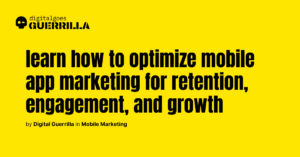Launching a mobile app is a milestone, but without the right marketing strategies, even the most innovative app risks being overlooked. Many app marketers make the mistake of focusing solely on downloads, forgetting that user retention, engagement, and growth are equally crucial.
In this guide, we’ll explore nuanced insights and actionable strategies to tackle these challenges and help your app not just survive but thrive. From understanding your audience to leveraging analytics, this post covers everything you need to know about successful mobile app marketing.
1. Understanding Your Audience: The Foundation of Mobile App Success
The cornerstone of effective mobile app marketing lies in knowing your audience deeply. How do you identify and target your audience effectively? Beyond basic demographics, dig into behavioral data: What problems does your app solve for them? What features do they value most? Consider conducting in-depth user surveys and leveraging analytics tools like Google Firebase or Mixpanel to create detailed user personas. For instance, a fitness app targeting busy professionals could emphasize quick workouts and integration with scheduling tools.
Personalization is another advanced consideration. Why is personalization important in digital marketing? Studies show personalized app experiences increase retention rates by 20%. Incorporate data-driven insights to tailor push notifications, emails, and in-app experiences to individual user preferences.
2. Crafting a Winning ASO Strategy (App Store Optimization)
Optimizing your app store presence is essential to stand out in competitive app marketplaces. While keywords and engaging descriptions are crucial, don’t overlook visual elements. High-quality screenshots and compelling video previews can increase conversions by up to 30%.
Additionally, leverage emerging trends like A/B testing of app store assets. Tools such as SplitMetrics or StoreMaven can help you refine titles, descriptions, and visuals to maximize user appeal. An often-overlooked tip: focus on user reviews. Encourage satisfied users to leave positive feedback, as apps with higher ratings rank better in search results.
3. Retention Over Downloads: Building Long-Term User Loyalty
A common pitfall is prioritizing downloads over user retention. Industry data reveals that 80% of users abandon an app within the first three days of downloading it. To combat this, implement a robust onboarding process. A real-world example comes from Duolingo, which uses gamified tutorials to make learning the app enjoyable from day one.
Push notifications are another tool to boost retention, but they must be used judiciously. Overuse can lead to uninstalls, while thoughtful messaging—like reminders based on user behavior—can improve engagement by 88%. Consider segmenting your audience to send hyper-relevant notifications that align with their activity and preferences.
4. Leveraging Paid and Organic Channels Together
A comprehensive marketing strategy blends paid and organic efforts. How to create a digital marketing strategy? Paid ads on platforms like Google App Campaigns or Meta Ads can drive immediate visibility, while organic methods, such as content marketing, offer sustained growth.
Experiment with influencer partnerships in your niche. How do you identify and choose influencers for a marketing campaign? For example, an app for photographers might collaborate with Instagram influencers to showcase its editing features. This approach not only boosts visibility but also builds trust with potential users. Pairing influencer campaigns with discount codes or limited-time offers can amplify results further.
5. Measuring What Matters: Analytics and KPIs for App Marketing
Data-driven decisions are the key to scaling your app effectively. Beyond download numbers, track metrics like customer acquisition cost (CAC), lifetime value (LTV), and churn rate. Tools like Adjust, App Annie, or Amplitude provide deep insights into these critical KPIs.
For example, if you notice high churn during onboarding, it’s a signal to simplify your process. On the flip side, understanding which features drive the most engagement can help you prioritize updates that matter most to your users.
FAQs: Addressing Common Mobile App Marketing Questions
How much should I spend on mobile app marketing?
It depends on your target audience and goals, but allocating 30-40% of your total app development budget to marketing is a good starting point.
What’s the best way to retain app users?
Combine a seamless onboarding process with personalized communication and regular app updates to keep users engaged.
Is ASO more important than paid marketing?
Both are crucial. ASO ensures organic discoverability, while paid marketing accelerates visibility and user acquisition.
How do I know if my app marketing strategy is working?
Track KPIs such as retention rate, CAC, LTV, and churn. Regularly analyze user feedback and app store reviews.
Are influencer campaigns worth it for app promotion?
Yes, especially if you partner with influencers who align closely with your target audience.
Conclusion: The Road to Mobile App Marketing Mastery
Mastering mobile app marketing requires a balanced mix of creativity, strategy, and analytics. By understanding your audience, optimizing your app store presence, focusing on retention, and leveraging data effectively, you can position your app for sustained success. Start implementing these strategies today and watch your app grow beyond downloads to deliver real value to users.


